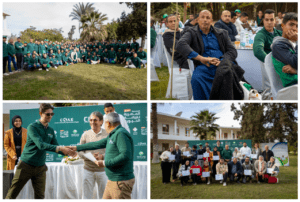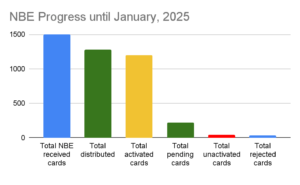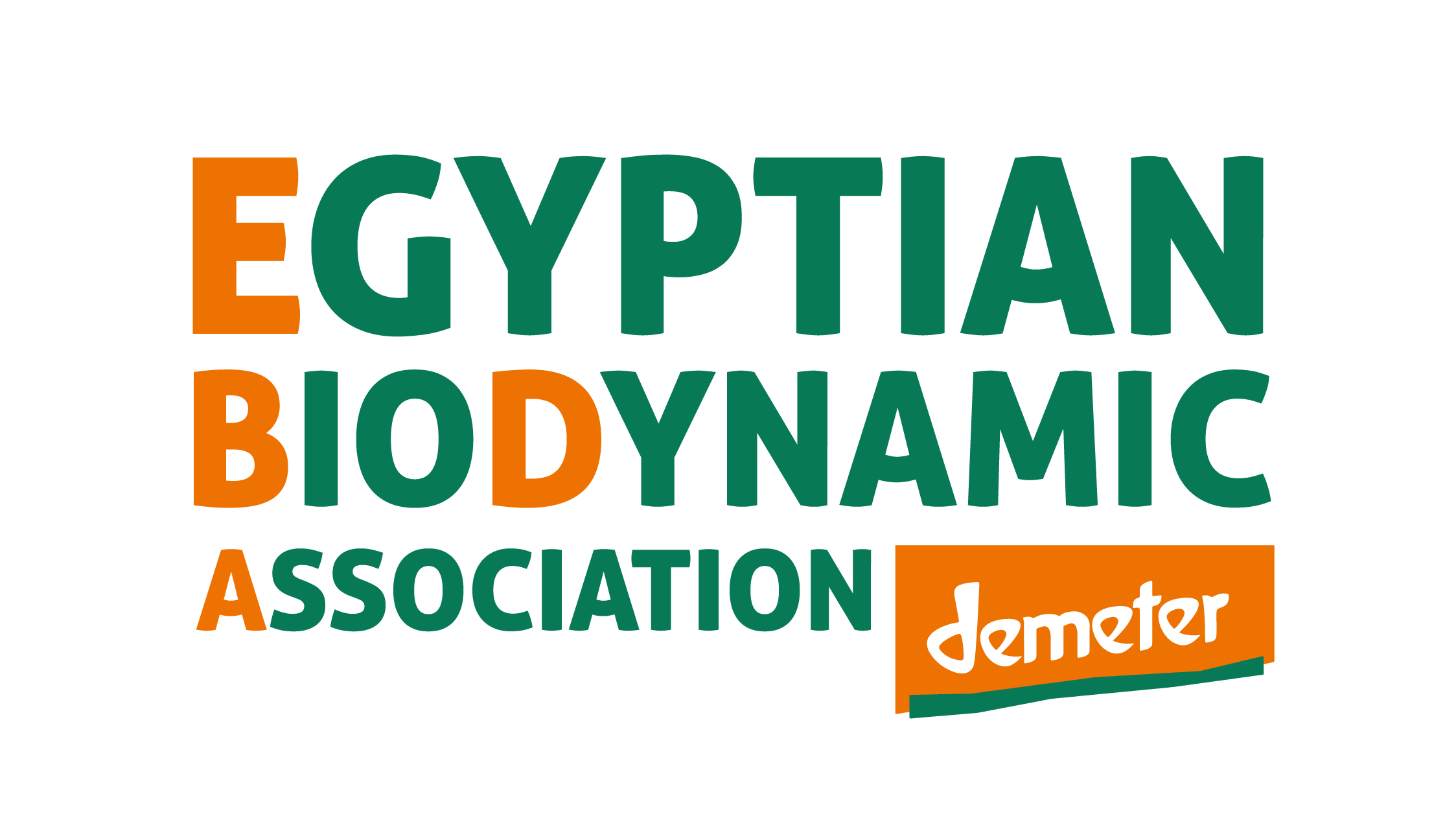EBDA in January 2025

EBDA-EoL Celebration 2025
A Remarkable Celebration of Achievements at Sekem Farm
The new year’s celebration 2025, held on January 4th at Sekem farm, was a well-organized event that brought together the Egyptian Biodynamic Association (EBDA) and the Project’s Partners (COAE, CFC, and SDF), alongside all field staff, office staff, and farmer champions. The event honored the collective efforts in supporting the biodynamic farming sector in Egypt throughout 2024 and celebrated the farmers who played a vital role in mitigating climate change through carbon sequestration in the soil. One of the key achievements celebrated was the successful appointment of 50 new engineers across various governorates, further strengthening the team’s capacity to drive sustainable agricultural practices.

NBE progress “Latest Updates on the NBE Status”
Since the start of the initiative to provide 1,500 farmers with Meeza cards from the National Bank of Egypt (NBE) And EBDA are continuing to achieve ongoing success , EBDA assigned team agreed to start with 1,500 farmers, and we distributed this number across different governorates through the engineers of the Egyptian Biodynamic Agriculture Association (EBDA), The team have reached 1,282 farmers, with 1,201 cards successfully activated, and the team is currently working on the process of completing the remaining 218 cards to finish the phase ,This partnership supports the bank’s commitment to sustainable economic practices and aligns with the EBDA vision and mission, which focuses on ecological balance and improving the financial operations sustainably. NBE and EBDA work together to support farmers who practice organic/biodynamic farming, helping them achieve sustainable income in line with the economic goals of the Economy of Love (EoL) By backing these initiatives, NBE helps balance economic, environmental, and social goals, supporting a more sustainable future for agriculture

EBDA Communications
This month, the media team focused on two major projects: creating educational content about mangoes and covering the EBDA event at Sekem farm. Additionally, we contributed to the ongoing Climate Heroes campaign. Below is a summary of our tasks and achievements.
Tasks and Achievements
1- Educational Videos on Mangoes
– Published 10 learning videos on YouTube.
– Topics included mango cultivation, care, and sustainability practices.
– Each video was optimized for engagement, with captions, thumbnails, and descriptions.
2- EBDA Event at Sekem Farm
– Attended and documented the event at Sekem farm.
Produced the following content:
– 2 reels for social media showcasing highlights of the event, which were well-received by the audience.
– Edited and finalized 150 photographs, capturing key moments and visuals from the event for use in future campaigns and documentation.
3- Climate Heroes Campaign
– Edited 5 new reels highlighting the Climate Heroes initiative.
– The reels focused on inspiring stories of individuals championing climate resilience, and they were prepared for social media distribution.
4- Leadership course
– The EBDA course for current and future leaders continued on. After discussing how to motivate people and the art of delegation last month, in January we focused on conflict resolution, using deep (active) listening. We not only learned about these in theory but practiced these using empathy walks and a Case Clinic exercise.
5- Public speaking course
– In January we started a public speaking course for the staff of the EBDA, CFC and Organic Egypt. We started off practicing improvised but still structured speeches (mostly used for toasts or meetings) and then we focused on planned speeches and storytelling in personal and professional presentations. Each participant also gave their first planned speech introducing themselves. The course will continue with story telling methods, body language and more.
Impact and Results
– The educational videos received positive feedback, enhancing awareness about mango cultivation.
– The event coverage increased EBDA’s visibility on social media, with the reels generating significant engagement.
– The Climate Heroes reels strengthened the campaign’s impact, promoting inspiring narratives and encouraging broader participation. Check the link for more insights about the EBDA.
EBDA Field Visits and Activities
1- International Fairtrade Audit:
– Participants: Eng. Mostafa and Eng. Attia Sobhy
– Date: January 4th -January 6th, 2025
2- Biodiversity Survey:
– Participants: Eng. Mostafa and Hiroshi
– Location: El-Sedik Farm, Damietta region
– Date: January 15th, 2025
– Purpose: Conducting a biodiversity survey for farmers utilizing biodynamic farming practices on their own farms.

2.1- Pilot Study in Damietta
On the 15th January 2025, a pilot study on biodiversity performance at farms in Damietta was conducted. The previous pilot study in Wahaat faced two key challenges: (1) some farmers couldn’t specify how much space for natural habitats they have outside their production site such as shrubs, water channels, side roads, and so forth, (2) the study was conducted by paper-based surveys, which makes it difficult to scale up the sample size. Therefore, another pilot study in Damietta was conducted on the following two purposes: (1) make sure that all the farmers fill the size of natural habitats in feddan, (2) use digital data collection tools such as Google Forms and/or Kobo to make it easier to scale up this research in the future.
The survey was successfully completed with the support of engineers. The research team arrived at a farm at 11:00, then immediately started the survey, and eventually took an hour till 12:00 to complete. Although the survey was planned to be conducted by either Kobo or Google Form, the paper-based approach was used in the end since some of the farmers didn’t have digital literacy as well as literacy.
2.2- Results
10 farmers filled the survey, and 10 reports were made for each farmer correspondingly as one of them is attached to this report in the section of Appendix. 4 farmers couldn’t read and write the Arabic language, engineers asked all the questions verbally and filled the survey on the behalf of those who didn’t have literacy. Although it was expected that 10 different results would be gained, 7 results turned out to be identical since 7 farmers work on the same farm. Therefore, 3 different results were gained from this trip to Damietta.
The general scores show that the category of farmed products stands at 13%, farming practices at 7%, small habitats at 24%, and large habitats at 33%. The scores indicate how much extent of biodiversity efforts are made at a farm compared to the best scenario defined by CFT. For instance, the farm adopts 13% of the items in the category of farmed products that are considered as beneficial for biodiversity. Overall, it is shown at this farm that the farmer makes relatively more biodiversity efforts to small and large habitats than to their cultivation area, and that there is much space for improvement in his biodiversity management practices.
The pie chart on the land management shows that 71.7% of the farm is production site, 18.2% is grass and flower habitats, and 10.1% is woody habitats. Combined with the result of general scores, it is suggested that more efforts to the production site should be made at this farm since the production site takes the highest proportion of the farm while the biodiversity efforts to its farming practices only stands at 7%.
Based on these results of general scores and land management ratio, it is estimated how much proportion of species for each category of living is likely to survive at the farm. Given that all the species stand less than 50%, this research suggests that the farm should make more biodiversity efforts.
2.3- Challenges
As a result of this pilot study, 3 new challenges were discovered. Given this study is expected to scale up from 10 farmers to a larger number of those across Egypt, these challenges listed below need to be solved.
a- Farmers’ literacy and digital literacy: some farmers cannot write and read, which makes it difficult to collect data through Kobo and Google Forms. Additionally, some farmers don’t have a phone or do not know how to use digital tools, which is also an obstacle to big-data collection.
b- Ownership of farms: some farmers are workers who do not own their farm. The survey was filled by these working farmers, but the results ended up the same as their owner since they work in the same farm by following the same farming practices. The solution would be to reach out to only multiple farmers since they have been trained for Kobo by EBDA. However, this is expected to cause bias in the results.
c- Difficulty in language: some farmers found it difficult to answer questions since the sentences in the survey are too long and grammatically complicated.
3- Meetings at the EBDA Headquarter:
– Participants: Eng. Mostafa , Eng. Attia and various stakeholders
– Focus: Engaging with individuals interested in organic and biodynamic farming
-Registration of a new farm with 750 acres and a new company called Al-Amal for Agriculture Projects.
4- Visit to El-Waly Farm:
– Participants: Eng. Mostafa and Eng. Attia Sobhy
– Date: January 21st, 2025
– Location: El-Waly Farm, West Suez
– Objective and focus: Provide instructions to the farm operator and farmers on Biodynamic farming practices

5- Participatory Guarantee System (PGS) progress
The first round of 2025 began on January 1st, involving 1,020 farms. This follows the completion of review training for peer reviewers and new agronomists to accommodate the continually growing number of member farms. Meanwhile, the certification process for farmers from the first round of 2022 is underway, with 53 farms being certified by the Center of Organic Agriculture (COAE) under the EoL PGS.
EBDA’s Agronomists Monthly Training
This month, the Egyptian Biodynamic Association (EBDA) continued its intensive 17-module training program for its agricultural engineers, focusing on two crucial topics:
- Organic Poultry Production – Exploring sustainable and ethical methods for raising poultry without synthetic additives, ensuring healthier food and improved animal welfare.
- Organic Medicinal & Aromatic Plants – Learning best practices for cultivating, harvesting, and processing these valuable crops while maintaining biodiversity and soil health.
The training was interactive, equipping engineers with practical knowledge and hands-on skills that they will transfer to farmers across Egypt. By strengthening their expertise, EBDA ensures that more farmers can adopt sustainable, organic practices—contributing to a healthier environment and food system.
EBDA Farmers’ Growth
The EBDA proudly kicked off the new year by celebrating its remarkable impact alongside its dedicated team and valued partners. Together, we have reached an incredible milestone—engaging with 16,000 farmers—and we extend our deepest gratitude to everyone driving this mission forward. With an ambitious goal of scaling up to 40,000 farmers by the end of 2025, our journey continues with momentum and purpose.
January 2025 has been another landmark month for the EBDA team across 18 regions in Egypt. Our 120 agronomists have made significant strides, successfully onboarding and registering 1,824 new farmers and 523 farms, covering a total of 10,700 feddans.
Farmers’ Training Supported by: KHNA project


